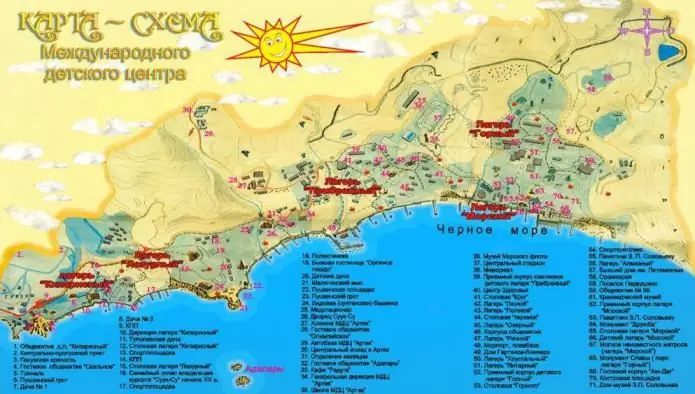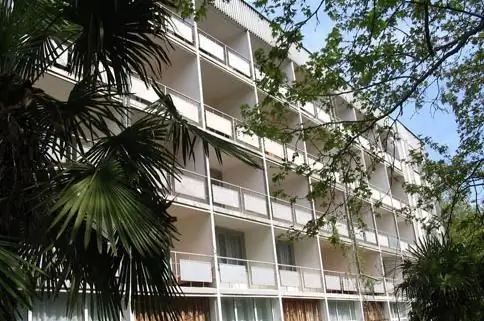- Author Harold Hamphrey hamphrey@travelwaiting.com.
- Public 2023-12-17 10:06.
- Last modified 2025-01-24 11:10.
"Artek" is a camp of international importance, located on the southern coast of Crimea. In Soviet times, this children's center was positioned as the most prestigious camp for children, a hallmark of the pioneer organization. About rest in this wonderful place will be discussed in this article.
Location
Where is the camp "Artek"? It is located in the vicinity of the village of Gurzuf, in the southern part of the Crimean peninsula. The Black Sea coast is distinguished by its extraordinary beauty and attracts the attention of tourists from all over the world. The camp is located 12 kilometers from the resort town of Y alta. It occupies an area of 208 hectares, of which 102 hectares are green spaces - parks and squares. From Mount Ayu-Dag to the urban-type settlement of Gurzuf, a coastline with children's beaches stretched for seven kilometers. In the city of Tokyo in 2000, the children's camp "Artek" was recognized as the best among 100,000 similar recreation centers in 50,000 countries of the planet.

Camp name
"Artek" - the camp that receivedits name according to its location. The children's center is located on the banks of the Artek River in the tract of the same name. There are different opinions regarding the origin of the lexeme "artek". Some researchers believe that it goes back to the Greek words "άρκτος" (bear) or "oρτύκια" (quail). In Arabic historical sources there is a mention of the country inhabited by the Russians "Artania", located in the Black Sea Russia.
In the children's center itself, a version about the "quail" origin of the name of the camp is popular. There is a song called "Artek - a quail island." This stable expression has firmly entered the lexicon of the guests and workers of the children's camp.
History
The Artek Pioneer Camp in Crimea originally served as a sanatorium for children suffering from tuberculosis. The initiative to create such an institution belonged to Zinovy Petrovich Solovyov, chairman of the Red Cross Society in Russia. For the first time, the camp opened its doors to young guests in 1925, on June 16th. During the first shift, Artek was visited by 80 children from the Crimea, Ivanovo-Voznesensk and Moscow. In 1926, foreign guests also appeared here - pioneers from Germany.
Initially, Artek residents lived in tarpaulin tents. Two years later, plywood houses appeared in the camp. The 30s of the last century were marked for Artek by the construction of a winter building in the upper park. In 1936, order-bearing pioneers, awarded with government awards, came to the camp, and in 1937, guests from Spain.
In the difficult years of the Second World War, the camp wasevacuated to Stalingrad, and later - to the city of Belokurikha, Altai Territory. In 1944, after the liberation of Crimea from the Nazi occupation, Artek began to be restored. In 1945, the territory of the camp increased to its present size.
Since 1969, Artek has been a camp with 3 medical centers, 150 buildings for various purposes, the Artekfilm film studio, a school, a stadium, 3 swimming pools and several playgrounds.

Prestigious award
The Artek camp, which in Soviet times was considered a prestigious bonus for special achievements in the study and social life of the country, hosted approximately 27,000 children annually. The guests of honor of the camp were personalities known throughout the world: Yashin Lev, Tereshkova Valentina, Tal Mikhail, Spock Benjamin, Ho Chi Minh, Togliatti Palmiro, Skoblikova Lydia, Schmidt Otto, Jawaharlal Nehru, Khrushchev Nikita, Kekkonen Urho, Gandhi Indira, Gagarin Yuri, Brezhnev Leonid, Jean-Bedel Bokassa. In 1983, in July, an American Samantha Smith came to Artek.
For a long time, Artek was a place for receiving delegations from countries near and far abroad.
History of modern "Artek"
Artek is a camp owned by Ukraine until recently (March 2014). Children from poor families, disabled people, orphans and gifted children rested there free of charge or on a subsidized basis. The full cost of living in Artek for three weeks was $1050-2150. Recent years have been difficult for this children's center, it has ceased to be year-round,in summer, its occupancy reached only 75%.
Now there are nine camps in Artek, some of which were planned to be converted into family boarding houses and youth centers. In 2008, in September, it was announced that the famous children's camp would become the training base for the national Olympic team. These plans were not destined to come true, however, in 2009, the general director of Artek, Boris Novozhilov, announced that due to funding problems, the children's center could be closed forever. The camp really stopped working, and its leader went on a hunger strike in protest. In 2009, a rally was held in Moscow in defense of Artek. It was organized on the initiative of people who once rested in the camp.

Structure
"Artek" is a camp with a complex and branched structure, which changed along with the development of this children's center. At the time of the collapse of the Soviet Union, Artek included five camps that could accommodate 10 pioneer squads: Cypress, Azure, Coastal, Mountain and Marine. This structure has survived to this day, but now the former pioneer squads are called children's camps, and the Coastal and Mountain buildings are called camp complexes. In addition, Artek has two mountain camp sites: Krinichka and Dubrava.
Artek Museums
Many attractions are located on the territory of the international children's center "Artek". The camp has several museums. The oldest of them - local history -exists since 1936.
Guests of Artek are always attracted by the Aerospace Exhibition, created on the initiative of Yuri Gagarin. Here you can see the space suits of the country's best cosmonauts - Alexei Leonov and Yuri Gagarin, and examine the operating equipment on which the first astronauts trained.
In the "Museum of the History of Artek", opened in 1975, you can get acquainted with the main stages of the development of the camp, see the gifts presented to the children's center by various guests and delegations.
The youngest museum in Artek is the Marine Exhibition. Its exposition will tell about the history of the Russian fleet.

Historical objects
Before the revolution, the vast territory on which the Artek camp is located (you can see the photos in this article) belonged to the nobles of various classes. Built in 1903, the Suuk-Su Palace testifies to this. This ancient building in 1937 was included in the "Artek". Now it hosts concerts and festive events, meetings and exhibitions.
In the family crypt of the owners of the estate - Olga Solovieva and Vladimir Berezin - a dump was arranged in Soviet times. Now the burial place has been cleared, on its walls you can see a fresco depicting Saints Vladimir and Olga.
Many ancient architectural monuments have been preserved on the territory of Artek: the Eagle's Nest hotel, the communication center building, the greenhouse, the pump room and others. They were built at the turn of the XIX-XX centuries.
Even older buildings are located in the eastern part of the camp. Their names are associated with the names of the owners of local lands: the Metalnikovs, Viner, Hartvis, Potemkins, Olizar. Now the buildings continue to function as premises for economic and cultural needs.
In the western part of Artek you can admire the ruins of a Genoese fortress that protected the local coast from the 11th to the 15th century. In the rock of Genevez Kaya, on which the structure was erected, a tunnel has been preserved, punched to observe the sea.
Natural objects
Ayu-Dag, or Bear Mountain, is a popular tourist attraction and a symbol of the southern coast of Crimea. The eastern border of Artek rests against it. Thanks to this mountain, the camp is protected from strong winds blowing from the sea. Ayu-Dag is firmly entrenched in the minds of Artek residents as part of the culture and life of the famous camp. The first residents of Artek climbed this mountain and left messages for the next shift in a huge hollow of a hundred-year-old oak that grew in the forests of Ayu-Dag. A lot of songs and poems are devoted to the bear-woe.
The books by Ilyina Elena "Bear Mountain" and "The Fourth Height" tell about the adventures of the Artek people during their trips to this mountain. The bear cub - the symbolic designation of Ayu-Dag - became one of the mascots of the Artek camp, and it was a great honor for honored guests of the camp to receive it as a gift. The comic ceremony "Initiation into Artek" is still traditionally held on the slopes of the famous mountain.
The surroundings of the Artek camp are decorated with two sea cliffs. They are called "Adalary", and they are also a symbol of the Crimean peninsula. Each unit at the end of the shift traditionallyphotographed against the background of these rocks.
Worthy of attention are also "Chaliapin's Rock" and "Pushkin's Grotto". These remarkable objects are connected with the life and life of our two wonderful compatriots.

Parks
The true decoration of the international children's center are the parks. Their importance was emphasized by the founder of the camp - Solovyov. Park construction began even before the construction of a children's he alth resort in the Artek tract. The camp, whose Crimean splendor of nature is striking in its brilliance and diversity, is decorated with various types of shrubs and trees. Sequoia and pine, cedar and cypress, magnolia and oleander grow on the territory of Artek. Here the olive grove rustles and the blooming lilacs are fragrant. Alleys and paths are intertwined in a bizarre pattern, complemented by strict silhouettes of stone stairs. Artek parks are filled with bushes trimmed in the shape of funny animals, they have real green labyrinths where you can really get lost.
48 cedars planted by children from forty-eight countries grow in the Friendship Square, located on the territory of the Lazurny camp. They symbolize peace and friendship between the peoples of different countries.
Artek parks are monuments of gardening art.
Artek in the art of cinematography
Since its foundation, Artek has been actively used for filming various films. Due to the abundance of sunny days a year, diverse exotic flora, mountainous terrain, picturesque sea coast, proximity to the branchGorky film studio and free children's extras, the Crimean coast of the Artek camp has become a favorite place for domestic directors. Films were filmed here: "Captain Blood's Odyssey", "Pirate Empire", "Andromeda Nebula", "Hearts of Three", "Matchmakers-4", "Hello, Children!", "Three", "In Search of Captain Grant" and many others.

What needs to be done to send a child to Crimea?
Children's camp "Artek" hospitably invites everyone to rest. Children aged 10 to 16 are accepted here. From June to September (during the summer period), children from 9 to 16 years old can relax here. Before the arrival of the guys, the ticket must be fully paid by bank transfer or cash. Before settling in the camp, children must undergo an in-depth medical examination, the result of which will be a medical card of the Artek sample. Also, please bring a photocopy of your passport or birth certificate.
When checking into the camp, young guests should be provided with: two pairs of shoes for the season (from October to April - waterproof and warm), slippers, sports shoes, swimming and tracksuits, socks. Also, the guys should have hygiene items with them: soap, toothbrushes, combs and handkerchiefs. "Artek" is a camp, the Crimean healing climate of which will have a beneficial effect on the he alth and well-being of your children.
How to get to Artek?
A huge territory of 208 hectares is occupied by Artek. Camp map providedto study in this article. To get to this children's center, you first need to come to the city of Simferopol. The administration of the camp must be warned about the arrival in advance - 7 days before settling. It is necessary to inform in writing about the time of arrival, the number of people, the flight number or the number of the train and carriage. Then you will be met, taken to the camp, and, if necessary, provided with food and overnight at the base-hotel of the Artek youth children's center in Simferopol. You must arrive strictly within the time specified in the ticket. Return tickets are purchased at the expense of camp visitors. "Artek" - a camp, reviews of which make you want to visit it.

Time and cost of stay
The cost of the Artek camp, that is, accommodation in it, varies depending on the season and the number of days spent in it. The standard stay at the IDC is 21 days. Accommodation for three weeks from December to May will cost 27,000 rubles. The price of staying in the camp in June and September ranges from 35,000 rubles. up to 49,000 rubles for the same period. The most expensive are July and August vouchers, their price reaches 60,000 rubles for 21 days. If for any reason the child leaves the camp ahead of time, then the money for the overpaid days will not be returned. "Artek" is a camp, the prices for accommodation in which are quite high, however, they are due to the costs of maintaining and developing the ICC.
Additional services of the Artek camp
In addition to the entertainment and wellness function, IDCArtek is committed to:
- If a child falls ill, provide food and appropriate medical care until recovery.
- Provide a seasonal uniform for the little guest (excluding underwear, shoes and hats).
- Be responsible for valuables deposited in the luggage room.
- Ensure the safety of the money that the child will bring with him. To do this, a personal account is opened in the name of each guest. Money is issued at the request of children. The amount that the guys will have with them should be sufficient for buying souvenirs, photographing, visiting a cafe and expenses for the return trip.
- Maintain the functioning of the school with a five-day work schedule. Homework will not be given to children. Please bring notebooks and pens for training.
International significance of Artek
Yearly the pioneer camp "Artek" is visited by children from different countries. In 1977, children from 107 countries of the planet became guests of the Let There Always Be Sunshine festival! In the late 90s, the tradition of holding such an event was renewed. The festival called "Let's change the world for the better" every year welcomes guests from all over the world. In 2007, this event was attended by children from thirty-six countries, in 2009 - forty-seven. In 2009, it was planned to accept children from seventy different countries. At such festivals, people from all over the world meet, share their cultural and pedagogical experience. The geography of the countries whose representativescome to Artek, which includes not only the powers of the post-Soviet space, but the whole world (even some exotic states). The most pleasant thing in such events is to observe how quickly children from different countries find a common language. One of the callings of ICC Artek lies in this important matter.






